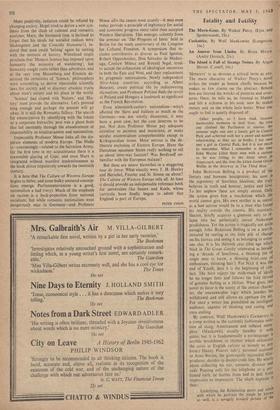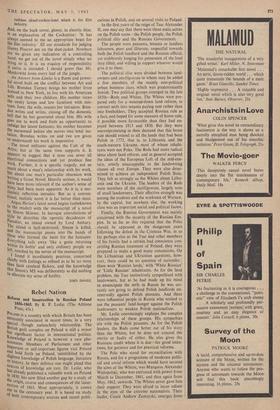`HONESTY' is as devious a critical term as any. The
main character of Walker Percy's novel strikes the reader as honest chiefly because he makes so few claims on the abstract. Behind him are littered the wrecks of patterns and struc- tures. Once, he tells us, he listened to Mahler and felt a sickness in his soul; now he makes money and on the whole feels better. What one ought to feel is quietly disposed of : Other people, so 1 have read, treasure
memorable moments in their lives: the time
one climbed the Parthenon at sunrise. the summer night one met a lonely girl in Central Park and achieved with her a sweet and natural relationship, as they say in books. 1 too once met a girl in Central Park, but it is not much
to remember. What 1 remember is the time
John Wayne killed three men with a carbine as he was falling to the dusty street in Stagecoach. and the time the kitten found Orson Welles in the doorway in The Third Man.
John Bickerson Bolling is a product of the literary and humane bourgeoisie; his aunt is the repository of Southern Idealism; she truly believes in truth and honour, justice and love. To her nephew these are simply unreal. Only the screen gives him a touchstone which the world cannot give. His own mother is as unreal as a bad actress would be to a man who found his reality outside the cinema. His secretary, Sharon, briefly acquires a glamour only to re- lapse into her pathetically unreal Alabaman prudishness. Yet the screen is tragically not quite enough. John Bickerson Bolling is on a search, initiated by staring at the little pile of change on his bureau and seeing it as belonging to some- one else. It is his thirtieth year (that age which Nick in The Great Gatsby celebrated as herald- ing a 'decade of loneliness, a thinning list of single men to know, a thinning brief-case of enthusiasm, thinning hair'). For Nick it was the end of Youth; here it is the beginning of con- tact. The hero rejects the mish-mash of ideals he no longer feels and follows the frail thread of genuine feeling as a lifeline. What gives this novel its force is the sanity of the central charac- ter, the unanswerable logic which justifies his withdrawal and still allows an aperture for air. For once a writer has postulated an intelligent audience, capable Of thinking and caring and even smiling.
By contrast, Wolf Mankowitz's Cockatrice Is a romp written in the currently fashionable mix- ture of slang, Americanese and inflated meta- phor. (Mankowitz usually handles it with gusto, but it is fundamentally a no-language. a terrible breakdown in rhythm which delineates the crisis in English culture as acutely as any form.) Danny Pisarov (ah!), personal assistant to Arno Borian, the grotesquely successful flat- producer, decides to double-cross him. He whirls about collecting his star, scenario, director and cash. Pausing only for the telephone or a Per- fumed bath, he hurtles from bed to bed, from impresario to impresario. The blurb explains it thus:
. Underlying the Rabelaisian gusto and relish with which he portrays the jungle he knows so well, is a savagely ironical picture of the ruthless cloud-cuckoo-land which is the film industry.
And, on the back cover, glossy, in electric. blue, is an explanation of the Cockatrice: 'It has always seemed to me an appropriate beast for the film industry.' All our standards for judging Danny Pisarov are on the dust-jacket. Nowhere are we given any indication of a controlling hand; we get out of the novel simply what we bring to it. It is an evasion of responsibility if satire is intended. I should guess that Mr. Mankowitz loves every leaf of the jungle.
An Answer from Limbo is a fluent and power- ful novel built on the conflict between Art and Life. Brendan Tierney brings his mother from Ireland to New York, to live with his American wife and their two children. His mother views the snaky lamps and low furniture with mis- trust. Jane, the wife, resents her intrusion. Bren- dan writes and writes, closing off the domestic hell that he has generated about him. His wife ?oes out to work and finds an opportunity to indulge her latent fantasies; his mother becomes the nursemaid before she moves into total iso- lation. Brendan writes on and (we are given to understand) his work is impressive. The novel militates against the Cult of the Artist, but at the same time supports it. It appears to suggest that a man can sever all emotional connections and yet produce fine work. Further, it- is a specific tragedy, not so much about a man's relationship with his work, but about one man's particular obsession with writing a Great Novel. Heavily serious, it would h. ave been more relevant if the author's sense of irony had been more apparent. As it is, a nar- cissistic reflection intrudes. But as a conven- tional, realistic novel it is far better than most. Angus Heriot's latest novel begins (unbeknown to the reader) with the manuscript of a novel by Simon Skinner. in baroque convolutions of ,stYle he describes the operatic decadences of raradiso, an island owned by Lord Astbury. The island is half-destroyed; Simon is killed, and the manuscript passes into the hands of those who formed the basis for the fantasies. Everything tails away 'like a genie returning within its bottle' and only ordinary people are left, touched by the terror of the manuscript. found it inordinately precious, concerned chieflY with feelings so refined as to be no more than faint cerebral flickers, and the knowledge that Simon's MS was deliberately so did nothing to alleviate my sense of futility.
JOHN DANIEL







































 Previous page
Previous page